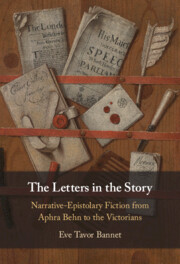Book contents
- The Letters in the Story
- The Letters in the Story
- Copyright page
- Contents
- Preface: “To the Reader”
- Acknowledgments
- Introduction The Letters in the Story
- Chapter 1 Framing Narratives and the Hermeneutics of Suspicion
- Chapter 2 Letters and Empirical Evidence
- Chapter 3 Cultural Expectations and Encapsulating Letters
- Chapter 4 Epistolary Peripeteiae
- Chapter 5 Hermeneutics of Perspective
- Notes
- Index
Chapter 3 - Cultural Expectations and Encapsulating Letters
Published online by Cambridge University Press: 25 November 2021
- The Letters in the Story
- The Letters in the Story
- Copyright page
- Contents
- Preface: “To the Reader”
- Acknowledgments
- Introduction The Letters in the Story
- Chapter 1 Framing Narratives and the Hermeneutics of Suspicion
- Chapter 2 Letters and Empirical Evidence
- Chapter 3 Cultural Expectations and Encapsulating Letters
- Chapter 4 Epistolary Peripeteiae
- Chapter 5 Hermeneutics of Perspective
- Notes
- Index
Summary
From the middle of the eighteenth century, narrative-epistolary novelists tended to distinguish investigation of the past from investigation of expectations of the future. Expectations are convictions about the probability of future conduct or events based on the likelihood that what mostly happened in the past and mostly happens in the present will also happen in the future.1 Given the supposition of Romanticists that concern with “futurity” was new in their period, it is important to notice that efforts to foresee or predict the future were intrinsic to probabilistic reasoning in science, commerce, and law from the seventeenth century, especially in areas where prudent practical action depended on a person’s ability to make rational “prognostications” or to proportion risk to gain.2 The financial instruments introduced during the 1690s, for instance, caused merchants, insurers, sellers of annuities, and speculators in joint-stock companies to bet on the future based on “reasonable,” because probable, expectations about what was likely to happen to a ship, company, stock, or human body in future time.
Information
- Type
- Chapter
- Information
- The Letters in the StoryNarrative-Epistolary Fiction from Aphra Behn to the Victorians, pp. 131 - 175Publisher: Cambridge University PressPrint publication year: 2021
